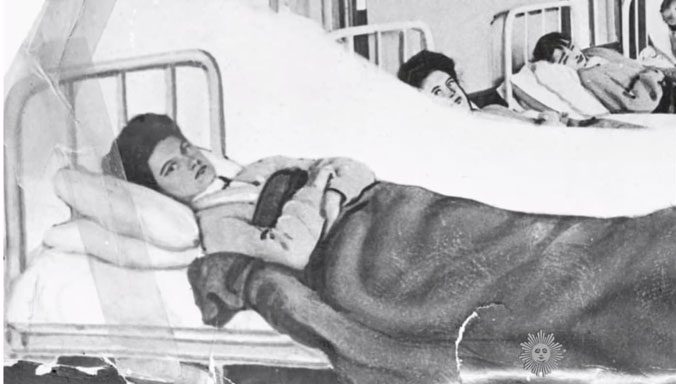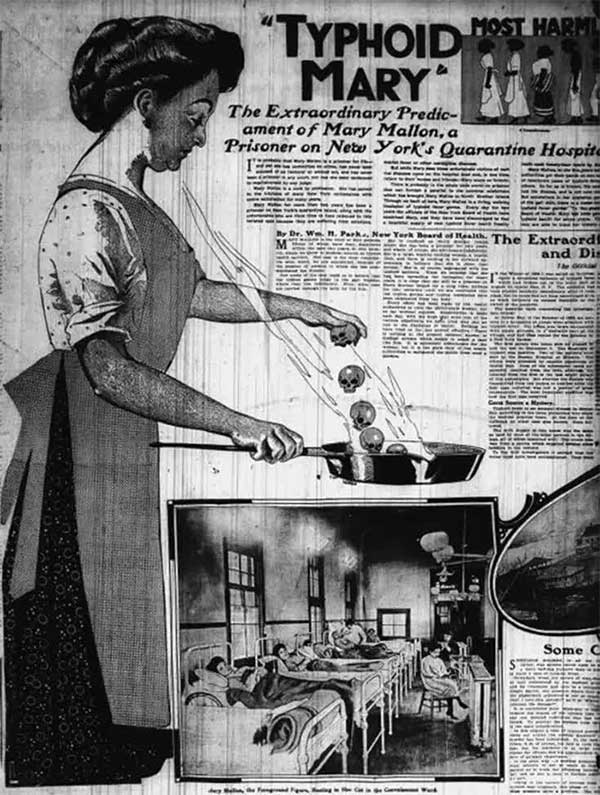Mary Mallon is a name that has sparked considerable controversy in medical history, also known by another name, “Typhoid Mary,” and she is recognized as the first asymptomatic carrier of the typhoid fever pathogen in the United States.
Forced into isolation for 23 years, Mallon’s story raises questions about public health, personal freedom, and the ethical aspects of controlling disease outbreaks.
Typhoid Fever Outbreak and the Discovery of Asymptomatic Carriers
In the early 20th century, a typhoid fever outbreak occurred in New York City, leaving the city’s health department perplexed as they could not identify the source of the illness.
Mary Mallon, an Irish immigrant, was working as a cook for wealthy families at the time. It was determined that although she had never exhibited symptoms of typhoid fever herself, she was an asymptomatic carrier. She transmitted the disease to others through her cooking.
The discovery that Mallon was an asymptomatic carrier was a groundbreaking revelation in the field of public health at that time. It highlighted the potential for healthy individuals to carry infectious diseases without showing any symptoms. This awareness raised questions about disease transmission and the necessity for preventive measures.

Mary Mallon in bed. She was forced into isolation as an asymptomatic carrier of typhoid fever.
The Controversial Quarantine of Mary Mallon
When Mary Mallon worked at the home of Charles Warren—a wealthy banker—trouble truly began. Warren rented a villa in Oyster Bay. When six members of his family fell ill, the community was thrown into panic.
Typhoid fever was considered a disease of the poor, typically spreading in slums. To investigate, Warren invited a pathologist named George Soper.
Soper examined the water supply and the oysters prepared for dinner—all of which were not the cause of the illness. He began to suspect Mallon. However, the high cooking temperatures killed many bacteria, making it challenging to find evidence to conclude that Mary was the source of the outbreak.
Eventually, Soper found the evidence. One time, Mallon served the Warren family ice cream for dessert—a dish that, of course, was not cooked—and this served as evidence against her.
Soper’s discovery was shocking, as until then, no one had known about a “living outbreak,” meaning a pathogen existing and spreading within a completely healthy individual.
To clarify the situation, Warren wanted to have Mary Mallon tested, but she fled. Mary continuously changed her name and places of employment, making it difficult to track her down.
Soper later convinced Mallon to get tested, but she threatened him with a knife. When he returned, he brought along a doctor and five police officers. Under the control of seven men, Mary was taken to the hospital.
After being identified as a carrier, Mary Mallon faced a controversial fate. In 1907, health officials were forced to isolate her on North Brother Island, a secluded location in the East River of New York. The cook was quarantined for three years, and the only living creature accompanying her in the wooden house was a dog. She was later released with a vow never to work as a cook again.
Five years passed normally, and then Mary Mallon took a job cooking at a maternity hospital. Here, she infected 25 people, resulting in two deaths. After a swift investigation, Mary’s false identity was uncovered. She was again detained on the desolate North Brother Island, this time for 23 years until her death.
The decision to isolate Mallon stirred debates about personal freedoms and the role of the state in controlling infectious diseases. Critics argued that Mallon was being imprisoned, violating her rights since she had never shown symptoms or intentionally harmed others.
On the other hand, supporters of quarantine emphasized the potential risks posed by asymptomatic carriers and the necessity of protecting public health.

Upon being identified as a carrier, Mary Mallon faced a controversial fate.
Mary Mallon was born in 1869 into the poorest family in a district of Northern Ireland. At the age of 14 or 15, Mary immigrated to America and began working as a cook for wealthy households. Her cooking talent was undeniable, earning her praise from every host. However, the cook frequently changed jobs. From 1900 to 1907, she cooked for seven different families, all of whom subsequently developed fever, some experienced diarrhea, and one person died.
Legacy and Impact on Public Health Policies
The case of Mary Mallon had a profound impact on public health policies and disease prevention strategies. Her situation drew attention to the importance of identifying and monitoring carriers of infectious diseases, even when they show no symptoms. The term “Typhoid Mary” has become a cautionary tale, prompting authorities to implement stricter regulations and monitoring measures.
After Mallon was quarantined, public health departments established guidelines for monitoring carriers and enforcing isolation measures when necessary. These policies aimed to strike a balance between protecting public health and respecting individual rights, a delicate task that continues to challenge healthcare systems to this day.
Lessons Learned and Ethical Considerations
The story of Mary Mallon raises significant ethical considerations related to disease control and personal freedom. It serves as a reminder that the intersection of public health and individual rights requires careful navigation. Balancing the need to protect society from infectious diseases with maintaining individual autonomy remains a complex challenge.
Mallon’s case also highlights the importance of education and awareness in preventing the spread of diseases. It emphasizes the need for continued research on asymptomatic carriers and the development of effective strategies to identify, monitor, and educate individuals who may unintentionally transmit infectious diseases.
Her case clarifies the complexity of disease transmission and the ethical dilemmas surrounding disease control measures. While her story serves as a cautionary tale, it also catalyzed improvements in public health policies and a better understanding of the delicate balance between protecting society and respecting individual rights. Mary Mallon’s legacy reminds us of the ongoing challenges in the field of infectious diseases and the importance of evidence-based strategies to safeguard public health.


















































